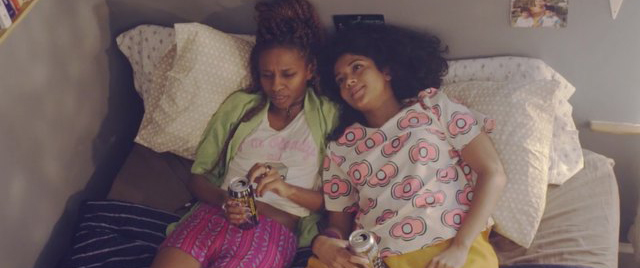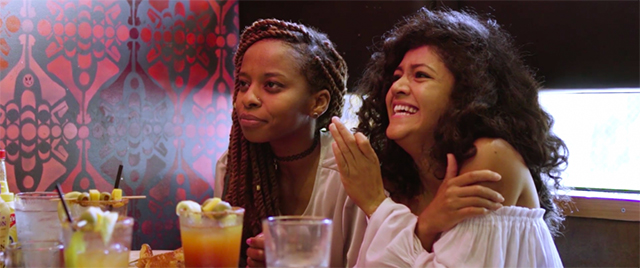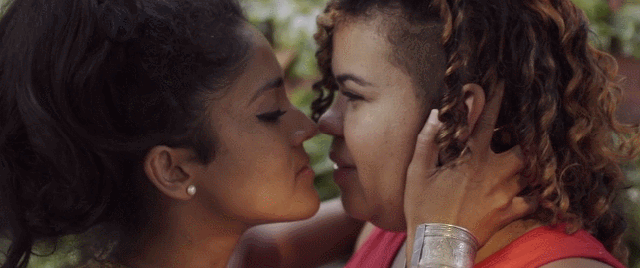The first season of Open TV’s Brown Girls ends with our protagonists sitting on a bed, sipping drinks as they rest against the wall. Patricia’s (Sonia Denis) spirit is crushed — she’s fought with a ex-lover who could’ve been more, she’s lost a job she never really wanted, but needed; she’s realized that somewhere along the way, she stopped working towards her dream of being a singer; and she’s had to ask her mom for money to cover the rent and groceries.
Aside from these moments with Leila, Patricia’s good at hiding what she’s feeling. Publicly, she professes an interest in being alone and single — she wears the mask of the strong black woman — but in the quiet moments, she admits that she doesn’t know what she wants to do and doesn’t know how to be alone. Like so many of us, Patricia’s tired of wearing the mask.
“We’re going to figure this out, okay? Everything’s going to be okay,” Patricia’s best friend, Leila (Nabila Hossain), assures her, her voice ripe with the confidence of someone who’s just conquered one of her own fears. Leila concocts a plan to solve her friend’s problem, undeterred by Patricia’s pessimism.

“Patricia, we’re going to make this work. I promise,” Leila says, and for a second, it looks like Patricia believes it. They toast the moment and clasp hands, as the series fades to black (or yellow, as it were) over the dulcet vocals of Jamila Woods.
On the one hand, the scene seems unremarkable — this is, after all, what best friends do — and, undoubtedly, it’s one we’ve seen in some iteration before. Except it’s not … not when those two friends are two brown girls.
Though we’ve seen a resurgence — Molly and Issa from Insecure and Lina and Jane on Jane the Virgin, for example — for the most part, being a woman of color on television means having a white BFF, or worse. Tracee Ellis Ross and Keesha Sharp once starred in Girlfriends, one of the greatest celebrations of black girl friendships on TV, but today, their characters on black-ish and Lethal Weapon have no friends. At best, characters of color are forced to substitute tight familial relationships for friendships with other people of color.
The other thing that makes the closing scene of Brown Girls so unique is that we don’t often get to see women of color be messy. Not like this. Sure, Olivia Pope and Annalise Keating are messy, but they have careers and extensive education that ground them in respectability. No one tells our coming of age stories — as if we go from wide-eyed children to fully formed adults overnight. With Brown Girls, Fatimah Asghar, the series’ creator, crafts a space where we can see the full scope of brown girl vulnerability.
For both Leila and Patricia, their vulnerability is a result of a changing identity. Leila’s interested in forging something new: trying to break out as a writer and exploring her queerness fully. Patricia, though, wants to reclaim something old: the identity she sacrificed for her ex-boyfriend. The scars of that relationship linger and the only thing Patricia can really commit to is not really committing to anything.
Hollywood’s reluctance to tell the stories of brown girls has always been rooted in — well, racism; but more precisely— the myth that white stories are neutral and, as such, are more relatable to the broader audience. And, undoubtedly, Brown Girls does an amazing job disproving that myth, creating an imminently relatable coming-of-age story. The show understands that specificity, not broad generalizations, breed commonality and understanding.

At the same time, though, if you don’t get it — if you can’t relate to the anxiety that Leila feels as she tries to tell her sister that she’s queer or if you can’t understand Patricia’s struggle to recapture her dreams — Brown Girls doesn’t really care. The series, loosely based on the real-life friendship Ashgar and Woods, is a story about people who live at the intersections for the people who live at those intersections.
As someone who’s spent the last eight months watching and listening to mass media coddle Trump voters, Brown Girls‘ indifference to those who can’t appreciate our shared humanity is refreshing. And, as someone who lives at intersection that the series chronicles, I find Brown Girls affirming.
I’m smitten with Leila from the second she rolls out of bed to answer her phone in the opening scene. Her voice still raw from sleep, she greets her Auntie, “Assalamu alaikum.” Leila dons a heavy accent for the conversation, lying to her Auntie about what she’s doing, where she is, if she’s going to mosque and if she’s been having sex. By the time her on-again, off-again girlfriend, Miranda (Melissa Duprey), awakes, her voice has returned to its normal timbre.
It’s the code-switching that captures my attention (well, that and the half naked girl in Leila’s bed). Leila reaffirms her connection to her Auntie through a shared sound and does so without even thinking about it. It’s part of the reality of so many communities of color — the way our styles of expression change, depending on our audience — and seeing it on Brown Girls makes me feel seen.
That phone call inadvertently pops the bubble in which Leila contains her queerness — a reminder that the world beckons with its disappointment and judgements. While Leila’s comfortable with her attraction to women, she’s not yet comfortable showcasing it. After a year of waiting for Leila to step out of the closet, Miranda’s done.
For Leila, wanting Miranda isn’t nearly as simple as Miranda makes it out to be. After the loss of her parents, she clings desperately to the family she has left, unwilling to risk being disowned. But the threats Leila’s spent a lifetime imagining dissipate, when her sister (Minita Gandhi) offers her full-throated support and reminds Leila that families aren’t just made, they’re built. It’s only then that Leila can make a sincere effort to win Miranda back.

Earlier this month, HBO announced that they were developing Brown Girls into a series. The creative team behind the web series, Asghar and Samantha Bailey, will also helm the cable adaptation.
It’s hard to know what the HBO version of Brown Girls will look like, not because Asghar and Bradley aren’t committed to telling this story, but because HBO’s money offers them opportunity that they couldn’t even have fathomed when shooting the web series. Issa Rae’s Insecure has a lot of the same sensibilities as Awkward Black Girl, the web series that preceded it. But the shows are vastly different.
One of the first hurdles the duo will have to contend with is the show’s title. It’s hard to imagine HBO replacing Lena Dunham’s Girls with a show called Brown Girls — it’d be a tacit admission that every critique made about Girls was right and I don’t foresee HBO going down that road. More significantly, though, is that by the time Asghar and Bradley have run the Hollywood gauntlet, there might already be a show on the air called Brown Girls.
Back in January, Freeform, the network that brought you The Fosters, began production called Brown Girls. Freeform’s version revolves around the friendship between two Indian women, Rimmi (Hina Abdullah) and Devi (Punam Patel). Thus far, though, Brown Girls isn’t on Freeform’s fall schedule. It’s a bit surreal to think of two networks in a race to get a show call Brown Girls on the air.
I’d love to see Brown Girls‘ HBO iteration become the love letter to Chicago that Donald Glover’s Atlanta is to that city. Right-wing rhetoric has crafted an image of Chicago that’s almost dystopian so part of Asghar and Bradley’s challenge is to reshape what Chicago looks like in our collective imaginations.
I want to see more of Patricia and Leila’s backstories, which Asghar touches on just enough for you to be drawn in. Who is Brendan, Patricia’s ex-boyfriend? What about him is so compelling that he could convince Patricia to put her dreams aside for his? What’s the story behind Mussarat and Leila’s dead parents? And was Leila so fearful of being queer that it drove her into the arms of a married man, 15 years her senior, who happens to be her boss?
Asghar created this show to provide a refuge during our current period of political unrest. She wanted to give provide share the joy that comes from laughter, believing that “having joy is what arms you to fight.” But as the show transitions from web series to cable series, I wonder how sustainable that is.
No one ever wants white supremacy to come in and steal joy our, but it does, and these days, that theft happens more regularly and more brazenly than ever before. How do you continue to ensconce a black woman and a queer South Asian Muslim woman from the peril of a coarsening world? Jane the Virgin, Atlanta and black-ish have created a blueprint for how comedies can tackle the serious issues facing people of color and hoping to see Asghar take up the mantle when Brown Girls debuts on HBO.
It’s hard to know when we’ll see Brown Girls on HBO — it took three years for Insecure to go from a pilot script to air — but whenever it comes to television, it’ll have a viewer in me. By telling the untold stories of brown girls like me, Asghar’s earned my faith and my viewership.
You can watch the full first season of Brown Girls right now on OpenTV.



@pecola GIRRRRRRLLL!!!!!!!!! I’m freaking out at your byline! I’m so excited to see you writing for AS!
(I am going back to read the entire article, obviously, but I was so excited that I had to just let out a proper “squeeeeeeee! OMG!” to start.)
Ok, now that I’ve read the whole article let me also add: It’s brilliant!! I’ve long known you were a strong writer from our interactions in the AS comment boards, but I was still blown away.
It’s not only the attention you take to setting the scene in the recap parts of your article- I’ve never seen the show but still could fully imagine the characters and background settings based on your descriptions alone- but also the way you connect the show to broader trends and politics.
From Trump voters to our dearly departed Girlfriends you really went there, ya feel me? And you were so, so right. I hope we are able to read more of your voice at Autostraddle in the future. I really enjoyed your commentary, as always.
I’ve long had Brown Girls on my to-do list, but had yet to get around to it. Between the HBO pick up news and this article, it’s now a priority. Can’t wait!
@c-p, Trust me, you weren’t the only one freaking out. I’m a weird combination of thrilled, honored and anxious about all of it.
Thanks for the feedback about this piece–your Queen Sugar recaps have set a high bar and I’m just trying to catch up.
No way, you got this! Definitely hit it out of the park!!
@pecola Congrats on the article! I hadn’t heard about this show before, but your review makes it sound awesome, and I completely trust your taste in TV, so I’m definitely gonna watch it!
Alison I completely agree! I’m excited for both @pecola and for a new to show to catch up on this summer!
@arvan12, thanks so much! The show’s so good…I think you’ll really enjoy it.
I saw two episodes of this show, and just thought it was really good. I really hope HBO keeps it the same, but of course is 30 minutes or so long per episode.
@pecola !!! OMG you’re here Too! So excited for your articles
It’s so good. Can’t wait for more!
I’m so pumped to see where Fatimah Asghar is going to take this show with HBO. The webseries had me ugly cackling in the middle of the night.
This article was great! I don’t really watch TV, but it’s pieces like this on Autostraddle that make me reconsider.
Thank you for writing about Brown Girls! I marathoned it back in March and was blown away by the production quality. The story itself is really great, but I was just really proud of them for putting together something so polished because it’s like they were saying, “Fine. If Hollywood won’t tell this story, we’ll do it ourselves and do an even better job.”
spent my night watching this series and I loved it. thank you for writing about it!